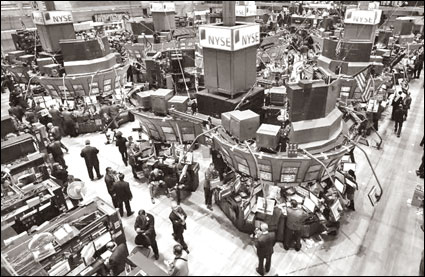Lessons from American economic crisis
Hema SENANAYAKE
Economies can fall apart amidst growth. Just prior to the Great
Recession of 2008 all economic parameters for the United States were
good. The GDP growth was good. The rate of unemployment was record low
at around four percent. Home ownership was all time high, Dollar was
strong and looked stable.
After the stock market crashed in August 2007 a few economists did
forecast that the economy might fall into a recession soon. The then
President George W Bush rejected those notions even in December 2007,
citing the above parameters to suggest that the economy was just fine
even if there were some difficulties.
|

Barack Obama |

George W Bush |
But the subsequent Great Recession in 2008 in the United States
proved that those parameters cited usually by economists and politicians
have nothing to do in predicting or preventing an economic crisis.
Economic crisis
When the economic crisis hit hard many mainstream economists found
fault with Wall Street executives who supposedly made bad housing and
credit card loans to those who cannot repay and also they found fault
with home owners and credit card holders who borrowed amounts knowingly
or unknowingly which cannot pay back.
In fact the main solution proposed and got approved in way of a bill
by Obama administration was based on the above observations. The bill is
called “Frank Wall Street Reform and Consumer Protection Act. This
federal statute in the United States was signed into law by President
Barack Obama on July 21, 2010. The said intention of this reform was to
avoid future financial and economic crises by ensuring that loans are
issued to those who can pay back.
As the above said parameters which were cited to deny the incoming
recession did nothing to prevent the recession, this reform bill
similarly will not prevent any future economic crises.
Recessions are nothing but breaking an important economic
equilibrium. That equilibrium is that consumers can’t buy what is
offered for the consumption. If the consumers can’t buy then
entrepreneurs/or producers would cut back production so stagnation or
recession would commence.
Consumer goods
|

Trading at the New York Stock Exchange. Picture courtesy: Google |
This is the equilibrium that broke in late 2007 in the United States
paving the way to imminent recession in 2008. Simultaneously this
equilibrium broke in the major economies in Europe too. Prior to that in
2000 Japan experienced a similar break down of this equilibrium pushing
the wonder economy in Asia into severe stagnation and due to this the
first decade of 21st Century is known as ‘lost decade’ by Japanese.
Why this is equilibrium breaks in advanced economies?
To answer this question we need to dig deep into economic theory. But
in order to find an analogue that explains the answer to this question
for lay readers I asked an entrepreneur a simple question. He is a
producer of consumer goods.
I said to him “Sir, assume that you do not buy anything outside, yet
can you pay an amount to your employees that is sufficient to buy the
produce if they are the only people who buy your produce including you?”
Wall Street
There was no hesitation, he said, “No if I want to expand the
business.”
His answer is accurately appropriate for the complex money based
economy where we live in today in the United States, Europe or in Sri
Lanka. What does this mean? This means that the economic system can
never pay the consumers an equal amount of money that is sufficient to
buy what is offered for the consumption by the economic system.
In short, aggregate consumer income is not sufficient to maintain the
above said important demand and supply equilibrium.
In fact as we practice economy around the globe there is no policy or
monetary mechanism to ensure this equilibrium in the long run.
The ‘Dodd’ “Frank Wall Street Reform and Consumer Protection Act”
signed by Obama will do nothing to ensure achieving this equilibrium on
continuing basis.
But of course this equilibrium between consumer liquidity (income +
credit) and the value of consumption is met in the short term by two
other mechanisms.
Those are (1) making money for consumption from stock and derivative
markets (2) consumer credit which includes private consumer borrowing
and the government’s deficit spending.
Increasing investment can’t increase the income of consumers that is
sufficient to buy what is offered by the system for consumption in the
long run.
To be continued |



